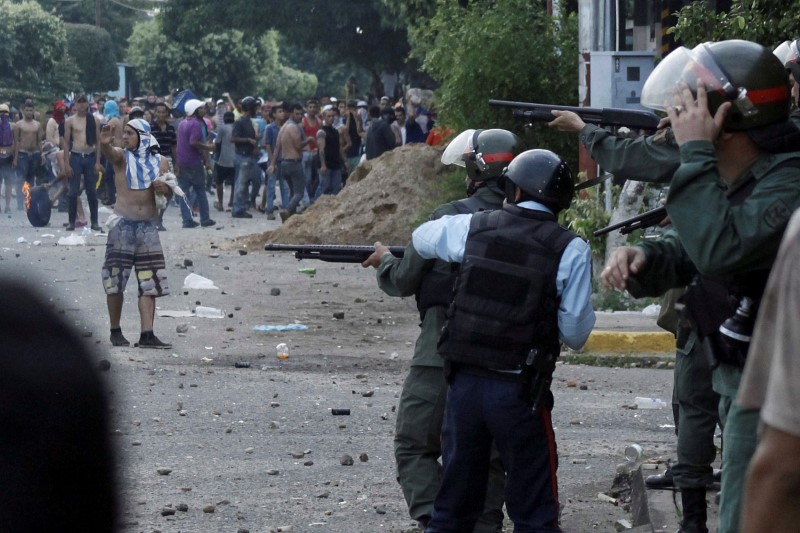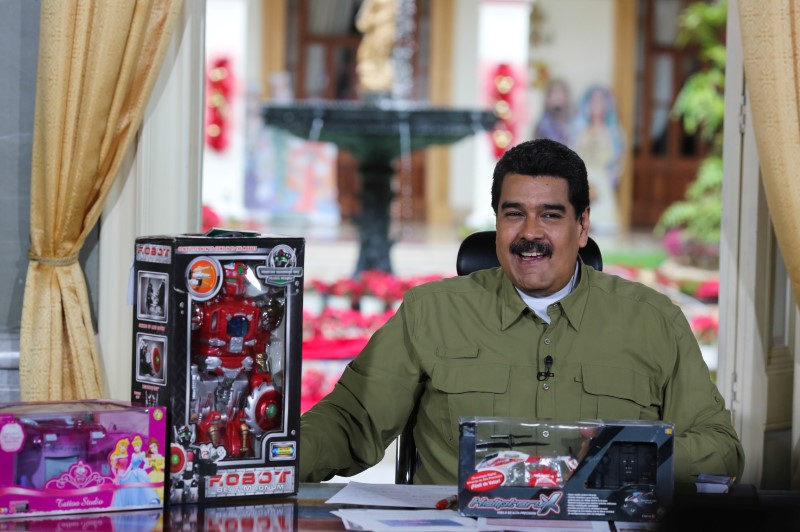
By Eyanir Chinea and Alexandra Ulmer
CARACAS (Reuters) – Venezuela’s chief prosecutor on Wednesday accused security officers of excessive force and condemned the use of military tribunals to judge protesters, deepening her split with President Nicolas Maduro’s government.
After nearly two months of massive anti-government rallies demanding early presidential elections, fissures have appeared in the hitherto publicly homogenous socialist administration.
In a speech on Wednesday, prosecutor Luisa Ortega said 55 people had been killed in unrest, around 1,000 others injured, and 346 properties burned or looted as chaos flares across the oil-rich country that is reeling from an economic crisis.
In one particularly controversial case, Ortega said investigations showed that 20 year-old student Juan Pernalete was killed by a tear gas canister fired from close range by a National Guard, not by a pistol as officials had suggested.
“Firing tear gas directly on people is banned,” she said, holding up a canister at a press conference that she gave at an alternative venue after a power outage in her office.
More than half of the injuries have been caused by security forces, she said, condemning violence on both sides.
Soon after the speech, her office announced two more deaths in the unrest, including a 14-year-old, taking the total to 57.
Ortega said her office was also investigating seven cases of military courts trying people who should be in civil courts. “We’re worried about the situation of those detained in military courts,” Ortega said, demanding access to detainees.
Rights group Penal Forum has said that 338 people have faced proceedings in military tribunals in recent days, with 175 still detained. It has said that in total, over 2,700 people have been arrested since early April, with more than 1,100 still behind bars.
“SHAM” VOTES
There was continued unrest around the country on Wednesday, with people barricading streets in some places and the opposition holding more protest marches. The Supreme Court ordered Caracas mayors to ensure that streets were clear and to take action against those responsible.
The pro-government electoral council said on Tuesday that voting for a controversial “constituent assembly” would be held in July and delayed state elections in December.
Maduro foes countered that was a sham designed to confuse Venezuelans, and to prompt infighting among the opposition and allow the unpopular leftist government to dodge free and fair elections they would likely lose.
Opposition lawmakers have said that the assembly, whose 540 members would be elected on a municipal level and by community groups like workers, would be filled with people who would merely obey Maduro’s orders to rewrite the constitution.
“Once installed, this constituent assembly will eliminate governorships, mayors, and the National Assembly,” said opposition lawmaker Tomas Guanipa.
“There’s been a break in Venezuela’s constitutional order, and the streets are our way to rescue it,” he said.
Maduro has said that he is facing an “armed insurrection” and the constituent assembly, a super body that would supersede all other public powers, is the way to restore peace to Venezuela. The former bus driver and union leader, elected in 2013, calls the opposition coup-mongers seeking to stoke violence and overthrow his “21st century Socialism.”
RIOTS AND LOOTING
Looting, roadblocks and riots are now commonplace around Venezuela given hunger, hopelessness, easy access to weapons, and gangs taking advantage of chaos as protests spin out of control.
In many places, school classes are canceled, public transportation is halted, and streets are barricaded. Some neighborhoods look like war zones after nighttime pillaging of bakeries and warehouses.
At some intersections, hooded young men ask passersby for money to “collaborate with the resistance.”
Traffic was blocked in parts of the capital on Wednesday.
The trouble has been particularly bad this week in Barinas, the home state of Maduro’s mentor and predecessor Hugo Chavez that the socialists regard as the “cradle of the revolution.”
Seven people died in protests there in the last few days, according to the state prosecutor.
A man who had been set alight on Saturday by protesters in Caracas appeared on state television from his hospital bed and said that he had been attacked for being a government supporter, echoing Maduro’s version of the incident over the weekend.
“They said I had to die because I was a ‘Chavista’,” said Orlando Figuera, adding that he was not a supporter of the ruling ‘Chavismo’ movement named for the former president.
Witnesses to that incident, including a Reuters photographer, had said the crowd accused him of being a thief. But officials have said that the attack on Figuera was an example of the “fascist” violence they are facing.
A protesting violinist, who has been a regular fixture playing the National Anthem and other tunes despite tear gas, flying rocks and petrol bombs in Caracas, told reporters that security forces broke his instrument on Wednesday.
A video of him crying with his smashed instrument went viral on Venezuelan social media. Supporters bought him a replacement.
(Additional reporting by Diego Ore, Mircely Guanipa, Corina Pons, Andrew Cawthorne, Andreina Aponte, and Brian Ellsworth; Writing by Alexandra Ulmer and Girish Gupta; Editing by Andrew Cawthorne, Toni Reinhold)









